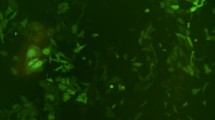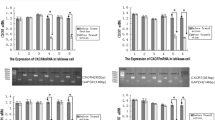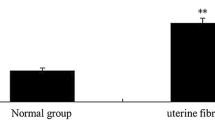Abstract
Purpose
To investigate the effect of silencing the YKL-40 gene on the expression of inflammatory factors and the effect of silencing the YKL-40 gene of THP-1 cells on endometrial cancer.
Methods
We used a siRNA targeting a sequence in YKL-40 (si-YKL-40) to transfect HEC-1A and THP-1 cells. Quantitative real-time polymerase chain reaction assay was performed to investigate the mRNA levels of YKL-40, IL-8 and MMP-9 in HEC-1A and THP-1 cells. Migration, and invasion assays were performed to identify the effects of co-culture with THP-1 cells that silenced YKL-40 gene on the migration and invasion capacity of HEC-1A cells. Tube formation ability were detected by Matrigel-based angiogenesis assay.
Results
We successfully transfected HEC-1A and THP-1 cells with lentivirus to silence the YKL-40 gene. Compared with the blank control group and NC group, the expression of YKL-40, IL-8 and MMP-9 which were examined by qRT-PCR in YKL-40-siRNA group was significantly reduced in the two cell lines; after co-cultured with the supernatant of transfected THP-1 cells, the migration and invasion ability of HEC-1A cells in YKL-40-siRNA group was significantly reduced; the number of tubes in the YKL-40-siRNA group was significantly reduced, the spacing between the tubes was significantly increased, and the structure of tubes was incomplete.
Conclusion
Silencing the YKL-40 gene in THP-1 cells can inhibit the expression of inflammatory factors, the invasion and migration of human endometrial cancer cells and the capacity of vitro angiogenic. And YKL-40 gene as a marker of inflammation may be an effective therapeutic target for endometrial cancer.





Similar content being viewed by others
References
Borghi C, Indraccolo U, Scutiero G, Iannone P, Martinello R, Greco P, Greco F, Nappi L (2018) Biomolecular basis related to inflammation in the pathogenesis of endometrial cancer. Eur Rev Med Pharmacol Sci 22(19):6294–6299. https://doi.org/10.26355/eurrev_201810_16038
Uygur B, Leikina E, Melikov K, Villasmil R, Verma SK, Vary CPH, Chernomordik LV (2019) Interactions with muscle cells boost fusion, stemness, and drug resistance of prostate cancer cells. Mol Cancer Res 17(3):806–820. https://doi.org/10.1158/1541-7786.MCR-18-0500
Chatterjee S, Chatterjee A, Jana S, Roy H, Nargis N, Bhattacharyya A (2018) Breast tumor-associated exosomes mediate loss of antitumor immune response by arresting cytotoxic T cell functions in the tumor microenvironment. Ann Oncol 29(Suppl 9):ix8–ix9. https://doi.org/10.1093/annonc/mdy427.003
Park W, Lopes G (2019) Perspectives: neutrophil-to-lymphocyte ratio as a potential biomarker in immune checkpoint inhibitor for non-small-cell lung cancer. Clin Lung Cancer 20(3):143–147. https://doi.org/10.1016/j.cllc.2018.12.003
Winkler I, Bitter C, Winkler S, Weichenhan D, Thavamani A, Hengstler JG, Borkham-Kamphorst E, Kohlbacher O, Plass C, Geffers R, Weiskirchen R, Nordheim A (2020) Identification of Ppargamma-modulated miRNA hubs that target the fibrotic tumor microenvironment. Proc Natl Acad Sci USA 117(1):454–463. https://doi.org/10.1073/pnas.1909145117
Jiang XF, Tang QL, Li HG, Shen XM, Luo X, Wang XY, Lin ZQ (2013) Tumor-associated macrophages correlate with progesterone receptor loss in endometrial endometrioid adenocarcinoma. J Obstet Gynaecol Res 39(4):855–863. https://doi.org/10.1111/j.1447-0756.2012.02036.x
Chen XJ, Deng YR, Wang ZC, Wei WF, Zhou CF, Zhang YM, Yan RM, Liang LJ, Zhong M, Liang L, Wu S, Wang W (2019) Hypoxia-induced ZEB1 promotes cervical cancer progression via CCL8-dependent tumour-associated macrophage recruitment. Cell Death Dis 10(7):508. https://doi.org/10.1038/s41419-019-1748-1
Lan C, Huang X, Lin S, Huang H, Cai Q, Wan T, Lu J, Liu J (2013) Expression of M2-polarized macrophages is associated with poor prognosis for advanced epithelial ovarian cancer. Technol Cancer Res Treat 12(3):259–267. https://doi.org/10.7785/tcrt.2012.500312
Li LY, Yin KM, Bai YH, Zhang ZG, Di W, Zhang S (2019) CTHRC1 promotes M2-like macrophage recruitment and myometrial invasion in endometrial carcinoma by integrin-Akt signaling pathway. Clin Exp Metastasis 36(4):351–363. https://doi.org/10.1007/s10585-019-09971-4
Gu S, Ni T, Wang J, Liu Y, Fan Q, Wang Y, Huang T, Chu Y, Sun X, Wang Y (2018) CD47 blockade inhibits tumor progression through promoting phagocytosis of tumor cells by M2 polarized macrophages in endometrial cancer. J Immunol Res 2018:6156757. https://doi.org/10.1155/2018/6156757
Fan JT, Li MJ, Shen P, Xu H, Li DH, Yan HQ (2014) Serum and tissue level of YKL-40 in endometrial cancer. Eur J Gynaecol Oncol 35(3):304–308
Torre LA, Islami F, Siegel RL, Ward EM, Jemal A (2017) Global cancer in women: burden and trends. Cancer Epidemiol Biomarkers Prev 26(4):444–457. https://doi.org/10.1158/1055-9965.EPI-16-0858
Landskron G, De la Fuente M, Thuwajit P, Thuwajit C, Hermoso MA (2014) Chronic inflammation and cytokines in the tumor microenvironment. J Immunol Res 2014:149185. https://doi.org/10.1155/2014/149185
Zeng Y, Yao X, Liu X, He X, Li L, Liu X, Yan Z, Wu J, Fu BM (2019) Anti-angiogenesis triggers exosomes release from endothelial cells to promote tumor vasculogenesis. J Extracell Vesicles 8(1):1629865. https://doi.org/10.1080/20013078.2019.1629865
Kubler K, Ayub TH, Weber SK, Zivanovic O, Abramian A, Keyver-Paik MD, Mallmann MR, Kaiser C, Serce NB, Kuhn W, Rudlowski C (2014) Prognostic significance of tumor-associated macrophages in endometrial adenocarcinoma. Gynecol Oncol 135(2):176–183. https://doi.org/10.1016/j.ygyno.2014.08.028
Ring KL, Yemelyanova AV, Soliman PT, Frumovitz MM, Jazaeri AA (2017) Potential immunotherapy targets in recurrent cervical cancer. Gynecol Oncol 145(3):462–468. https://doi.org/10.1016/j.ygyno.2017.02.027
Hashimoto I, Kodama J, Seki N, Hongo A, Miyagi Y, Yoshinouchi M, Kudo T (2000) Macrophage infiltration and angiogenesis in endometrial cancer. Anticancer Res 20(6C):4853–4856
Jiang S, Yang Y, Fang M, Li X, Yuan X, Yuan J (2016) Co-evolution of tumor-associated macrophages and tumor neo-vessels during cervical cancer invasion. Oncol Lett 12(4):2625–2631. https://doi.org/10.3892/ol.2016.5014
Szewczyk G, Maciejewski TM, Szukiewicz D (2019) Current progress in the inflammatory background of angiogenesis in gynecological cancers. Inflamm Res 68(4):247–260. https://doi.org/10.1007/s00011-019-01215-1
Karan D (2018) Inflammasomes: emerging central players in cancer immunology and immunotherapy. Front Immunol 9:3028. https://doi.org/10.3389/fimmu.2018.03028
Dong T, Santos S, Yang Z, Yang S, Kirkhus NE (2020) Sputum and salivary protein biomarkers and point-of-care biosensors for the management of COPD. Analyst 145(5):1583–1604. https://doi.org/10.1039/c9an01704f
Pollard JW (2004) Tumour-educated macrophages promote tumour progression and metastasis. Nat Rev Cancer 4(1):71–78. https://doi.org/10.1038/nrc1256
Krishnan V, Schaar B, Tallapragada S, Dorigo O (2018) Tumor associated macrophages in gynecologic cancers. Gynecol Oncol 149(1):205–213. https://doi.org/10.1016/j.ygyno.2018.01.014
Szymanska-Chabowska A, Juzwiszyn J, Jankowska-Polanska B, Tanski W, Chabowski M (2020) Chitinase 3-like 1, nestin, and testin proteins as novel biomarkers of potential clinical use in colorectal cancer: a review. Adv Exp Med Biol. https://doi.org/10.1007/5584_2020_506
Funding
The study was funded by the National Natural Science Foundation of China (No.81360388) and Guangxi Natural Science Foundation (No.2016 GXNSFAA380258).
Author information
Authors and Affiliations
Contributions
All the authors have read the manuscript and agreed to its being submitted for publication. All listed authors meet the appropriate authorship criteria. Nobody who qualifies for authorship has been omitted from the list. All authors have approved the acknowledgment of their contribution. LQ experimental operation, data collection or management, data analysis, manuscript writing/editing. FJT protocol development, data analysis. LL conceived the study, protocol development.
Corresponding author
Ethics declarations
Conflict of interest
The authors have no conflict of interest or financial interest in any commercial companies pertaining to this article.
Additional information
Publisher's Note
Springer Nature remains neutral with regard to jurisdictional claims in published maps and institutional affiliations.
Rights and permissions
About this article
Cite this article
Luo, Q., Fan, J. & Li, L. Silencing YKL-40 gene can inhibit inflammatory factor expression and affects the effect of THP-1 cells on endometrial cancer. Arch Gynecol Obstet 305, 467–473 (2022). https://doi.org/10.1007/s00404-021-06194-5
Received:
Accepted:
Published:
Issue Date:
DOI: https://doi.org/10.1007/s00404-021-06194-5




